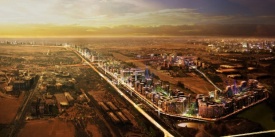
Limitless, the Dubai developer has been working towards drawing third-party developers to restart work on the AED 70 billion 200 hectare township project in Downtown Jebel Ali, which was initially launched in 2006, according to The National.
The developer stated that Dar Al Handash, a design and supervision consultant has been assigned the responsibility to assess and overlook the current infrastructure on the project’s zones 2, 3, and 4 and insure that the process is in place for sub-developers to further expand and develop.
Limitless further announced that it has conferred Dar Al Handash a contract of AED 19.5 million to evaluate the roads network, electricity, and water and sewerage connections on the site. The developer also stated that it would be issuing contracts to build the additional infrastructure required on the site by the end of the year, by putting out tender.
The Jebel Ali township project will have 326 buildings which will house approximately 70,000 residents and 235,000 workers. The project was separated into four different zones, and each zone was designed to have its own commercial and residential areas, including shops, hotels, offices and apartments, and all the zones were to be linked via a light railway.
Despite the fact the Limitless was able to finish groundwork in zone one and complete four of the eight buildings at the Galleries commercial scheme, nearly about 300 plots and sell them off to third party developers, the work was stalled.
The statement made by Limitless comes at a time of number of recent developments made at the stalled project and has been supported by the government, who has been backing megaprojects near the 2020 Expo site and Al Maktoum Airport.
Faisal Durrani, Cluttons international research and business development manager stated that the 2020 Expo has been leading to a number of construction projects across Dubai and will help lead the next cycle of growth in the city. He also said that the real estate and residential sector will benefit as the number of households and residents in the city increase, though the commercial sector is to benefit the most.






